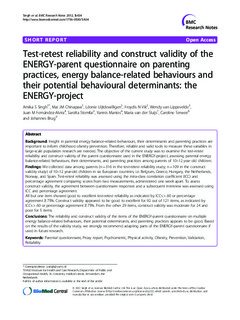| dc.description.abstract | Background: Insight in parental energy balance-related behaviours, their determinants and parenting practices are
important to inform childhood obesity prevention. Therefore, reliable and valid tools to measure these variables in
large-scale population research are needed. The objective of the current study was to examine the test-retest
reliability and construct validity of the parent questionnaire used in the ENERGY-project, assessing parental energy
balance-related behaviours, their determinants, and parenting practices among parents of 10–12 year old children.
Findings: We collected data among parents (n=316 in the test-retest reliability study; n=109 in the construct
validity study) of 10–12 year-old children in six European countries, i.e. Belgium, Greece, Hungary, the Netherlands,
Norway, and Spain. Test-retest reliability was assessed using the intra-class correlation coefficient (ICC) and
percentage agreement comparing scores from two measurements, administered one week apart. To assess
construct validity, the agreement between questionnaire responses and a subsequent interview was assessed using
ICC and percentage agreement.
All but one item showed good to excellent test-retest reliability as indicated by ICCs>.60 or percentage
agreement≥75%. Construct validity appeared to be good to excellent for 92 out of 121 items, as indicated by
ICCs>.60 or percentage agreement≥75%. From the other 29 items, construct validity was moderate for 24 and
poor for 5 items.
Conclusions: The reliability and construct validity of the items of the ENERGY-parent questionnaire on multiple
energy balance-related behaviours, their potential determinants, and parenting practices appears to be good. Based
on the results of the validity study, we strongly recommend adapting parts of the ENERGY-parent questionnaire if
used in future research. | no_NO |
